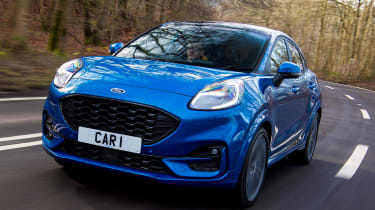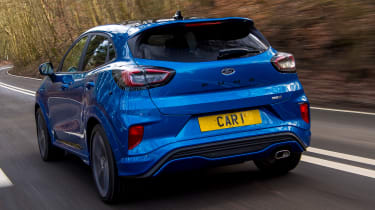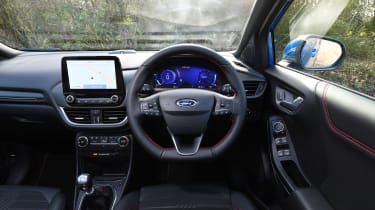New Ford Puma 2020 review
The new Ford Puma isn't designed to carry the legacy of its predecessor, but it’s a welcome addition to the smaller end of Ford's crossover line-up.

Verdict
Finally, Ford has brought us a proper small SUV based on the Fiesta. The reborn Puma isn’t a car to carry on the torch of its fun, front-wheel-drive coupe predecessor, but it’s a welcome addition to the smaller end of the brand’s crossover line-up, and a far more refined and modern car than its EcoSport sibling. It’s good to drive, practical and decently economical, thanks to mild-hybrid tech across the board. The looks will divide, however, and the interior quality can’t match some rivals’.
In case you’ve been sleeping under a rock, Ford’s decision to reintroduce the Puma nameplate on a new small SUV hasn’t been a universally popular move. What has been largely established, however, is that the new Puma is the small Ford SUV buyers have been craving for some time now. Ford has finally pulled its socks up and taken this booming segment seriously.
That’s because until now, the smaller, tougher, but rougher EcoSport was all buyers after a B-segment crossover from the blue oval were being offered. It stays on sale alongside the new Puma, priced from a little less, retaining its boxier, more rugged image, as well as its outdated driving dynamics.
The new Puma, meanwhile, embraces a more Fiesta-based back story and squares up to a clutch of box-fresh rivals such as the Skoda Kamiq, Volkswagen T-Cross, Nissan Juke, Peugeot 2008 and Renault Captur.
It’s based on the same platform as the Fiesta, and it’s one of the smaller B-segment SUVs out there, with only a couple of major rivals coming in shorter and lower. It’s separated from the Fiesta with a design of its own, and it’s quite unlike the EcoSport and the larger Kuga in appearance, too.
Used - available now
Every Puma from launch gets a turbocharged 1.0-litre three-cylinder petrol engine with mild-hybrid assistance. Driven here is the higher output version of that engine, featuring 153bhp (you get 123bhp in base models) and a six-speed manual gearbox.
We’ve lumped plenty of praise on Ford’s three-cylinder engine in recent times; this versatile 1.0-litre is a treat in the regular Fiesta, and the 1.5-litre found in the Fiesta ST proves that you don’t need four cylinders to make a great hot hatchback. And the brand’s first attempt at applying mild hybrid technology to its EcoBoost three-pot is commendable too.
Alongside the petrol engine is a belt-driven generator, which recuperates energy naturally lost while driving - think braking especially - before storing it in a tiny battery. This electrical energy is then used to assist the engine during acceleration, reducing the amount of petrol needed to get moving via an additional 50Nm of electricity-derived torque. You can toggle a display on the new digital instrument panel to see exactly when the system is in action. Alongside it, cylinder deactivation means the engine can run on two cylinders when it can get away with it.
It means that in spite of the good level of power, the Puma is also competitively economical. Attaining 40mpg is effortless, and use the dedicated Eco drive mode and you’ll edge closer to the 50s. Ford itself claims that up to 58.9mpg is possible.
This isn’t the smoothest or most sophisticated three-cylinder set-up out there, though. The TSI engines found in VW Group cars feel a little more mature, and the MHEV integration doesn’t help in this regard, especially given you can’t alter the amount of braking recuperation. It’s set at a constant, unchangeable level, that’s just about detectable if you lift off the throttle, so get used to it.
It’s a good enough performer, though, and quiet enough at motorway speeds. Importantly, it teams up with a good six-speed manual action, nice steering and chassis work nabbed from the Fiesta, to ensure that the Puma is a good small crossover to drive. ST Line X cars like ours get sports suspension. It’s on the firmer end of the spectrum for SUVs of this size, especially on the optional 19-inch wheels, but the extra control and confidence you get from behind the wheel is probably worth the trade-off.
Though it’s a smaller B-SUV, the Puma is fairly spacious inside. Room up front is very good, while the rear bench is an acceptable size owing to the car’s bulbous shape. A boot of 456 litres is generous enough in this class, and there’s virtually no lip to get over, so awkward items shouldn’t be too tricky to load. The boot floor is adjustable too, and underneath it is a large, so-called ‘Megabox’ hidden storage area.
Venture into the cabin and you’ll find a dashboard and centre console design lifted from most modern Fords, but the plastics on show at arm’s height aren’t the Puma’s finest area. There’s acres of hard black stuff all over the interior, with the partial leather finish found in our car part of the ‘X’ pack stacked on top of sporty ST Line trim. So there are small SUVs out there for this money with nicer interiors, but the Ford’s central infotainment screen and digital dashboard are both strong points, being sharp and easy to navigate.
As for price and equipment, what you get for the money is fundamentally a solid enough package. The eight-inch display has built-in navigation, Apple CarPlay and Android Auto for all your navigating and communication needs. Adaptive cruise control is standard-fit from ST-Line up, as is the 12.3-inch digital instrument cluster and a wireless charging pad for smartphones. You’ll also get LED projector headlights, rear parking sensors and a bundle of driver assistance and automatic safety features.
Pay monthly on a PCP and the Ford is straightforwardly priced. It’s distinctly cheaper than a Volkswagen T-Cross, but you’ll be in a Skoda Kamiq SE L 150 for less. That’s said, the Skoda - our favourite small SUV at the moment - doesn’t quite match the Ford’s dynamic panache or all-round flair.
| Model: | Ford Puma 1.0 Hybrid MHEV 155PS ST-Line X |
| Price: | £23,465 |
| Engine: | 1.0-litre 3cyl petrol MHEV |
| Power/torque: | 153bhp/240Nm |
| Transmission: | Six-speed manual, front-wheel drive |
| 0-62mph: | 8.9 seconds |
| Top speed: | 124mph |
| Economy/CO2: | 41.5mpg / 101g/km |
| On sale: | Now |















